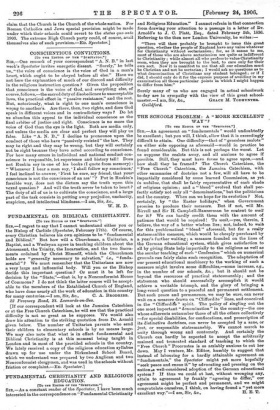FUNDAMENTAL OR BIBLICAL CHRISTIANITY. [To THE EDITOR OF THE "SPECTATOR."'
SIR,—I regret to say that I cannot understand either you or the Bishop of Carlisle (Spectator, February 17th). Of course, every Christian believes his own opinions to be "fundamental and Biblical." But how will a Churchman, a Unitarian, a Baptist, and a Wesleyan agree in teaching children about the Atonement, the Trinity, the Incarnation, and the two Sacra- ments ordained by Christ Himself, which the Churchman holds are "generally necessary to salvation," i.e., " funda- mental" ? We must remember that the Unitarians are now a very large and influential body. Will you or the Bishop decide this important question ? Or must it be left for decision by the "State,"—that is, by a Nonconformist House of Commons ? I do not think the latter course will be accept- able to the members of the Established Church of England, who have done nearly all the work of education in this country [If our correspondent will look at the Jamaica Catechism or at the Free Church Catechism, he will see that the practical difficulty is not so great as he supposes. We would also draw his attention to the striking quotation from Dr. Arnold given below. The number of Unitarian parents who send their children to elementary schools is by no means large' We may also note that what is in effect fundamental and Biblical Christianity is at this moment being taught in London and in most of the provided schools in the country. We lately received a copy of the religious education syllabus drawn up for use under the Birkenhead School Board, which we understand was prepared by two Anglican and two Nonconformist clergymen, and was used in the schools without friction or complaint.—En. Spectator.1










































 Previous page
Previous page